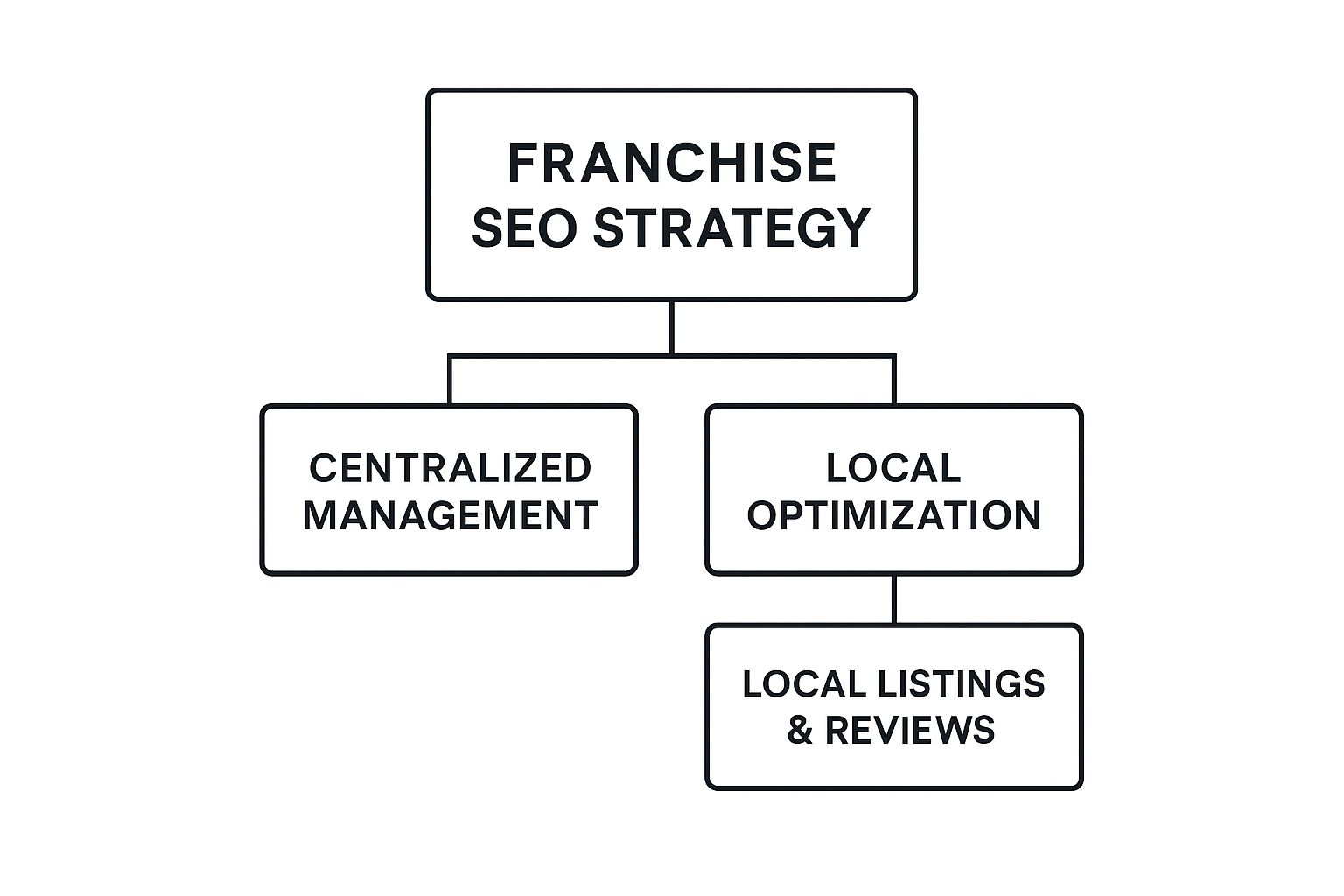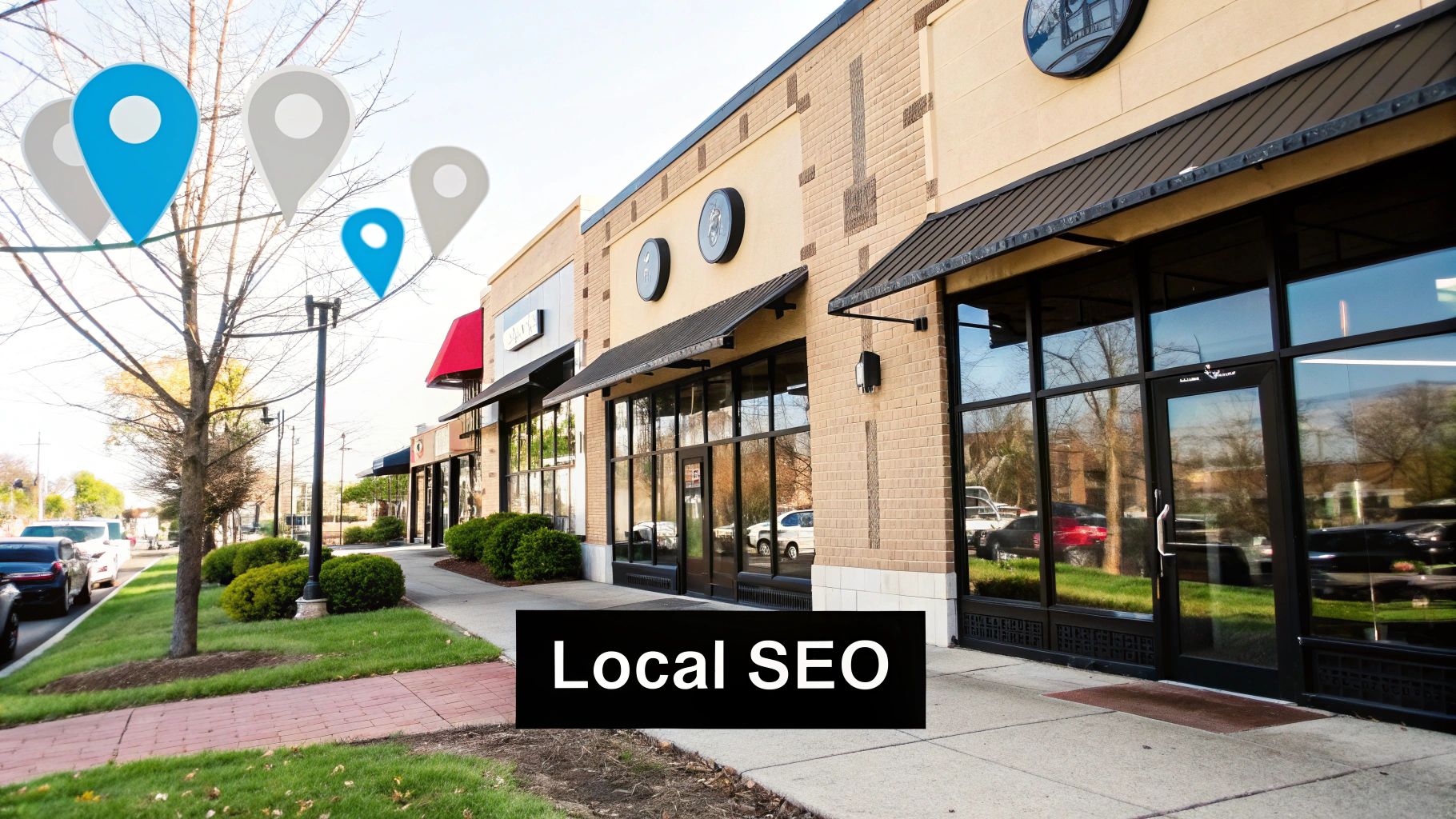Franchise SEO is a specialized game plan designed to boost the online presence of businesses with multiple locations. Unlike standard SEO, it’s a delicate balancing act. You have to build the authority of the main corporate brand while also making sure each individual franchisee dominates their local market. The goal is to help every location attract customers in its specific territory without cannibalizing traffic from sister locations.
Unpacking the Franchise SEO Playbook
Think of a franchise like a pro sports league. The corporate brand is the commissioner's office—building national recognition, setting the rules, and managing the league's identity. But the games are won locally by the individual teams—your franchisees—who need to sell tickets and pack their stadiums. Standard SEO is like promoting the entire league. It’s important, but it doesn't do much to help one specific team sell out on a Friday night.
That’s where specialized franchise SEO services come in. They’re the playbook for both the league and the individual teams, making sure everyone works together. The real challenge is finding that sweet spot: How do you keep a strong, unified brand message while letting each location connect authentically with its local community? A generic SEO plan just can't handle that kind of complexity.
This dual focus—central brand management plus targeted local optimization—is the key to making it all work.

As the visual shows, success really hinges on blending the big-picture brand strategy with on-the-ground local tactics.
The Hyper-Local Imperative
For any franchise, winning online means winning locally. It's that simple. Today’s customer journey almost always starts with a location-specific search on their phone. In fact, a whopping 46% of all online searches have local intent, and queries with phrases like "open now near me" have absolutely exploded.
Practical Insight: Imagine a parent with a sick child at 8 PM. They aren't searching for "urgent care clinics"; they're searching for "urgent care open now near me." If your local clinic's Google Business Profile isn't optimized with accurate hours, a correct pin on the map, and a clickable phone number, you lose that customer to a competitor in seconds. This is the moment where hyper-local SEO pays off.
If you’re not showing up in those local results, you’re basically invisible to a huge chunk of your potential customers. This is exactly why a rock-solid local SEO strategy is non-negotiable for any business with more than one location.
A great franchise SEO strategy turns a national brand into a collection of strong neighborhood businesses, ensuring every single location pops up the moment a local customer starts searching.
Why a Standard Approach Falls Short
Trying to slap a single-business SEO strategy onto a franchise network usually creates more problems than it solves. It’s a classic case of a square peg in a round hole. For example, a single-location bakery might focus on the keyword "artisan sourdough." But if a franchise bakery with 10 locations in the same metro area does this, all 10 locations might compete against each other, confusing Google and splitting their authority.
To quickly see why a specialized approach is so critical, let's break down the key differences between a standard SEO campaign and one built for a franchise network.
Franchise SEO vs Standard SEO Key Differences
| Aspect | Standard SEO (Single Business) | Franchise SEO (Multi-Location) |
|---|---|---|
| Geographic Focus | Single city or service area. | Dozens or hundreds of unique local markets. |
| Keyword Strategy | Targets broader keywords. | Hyper-local keywords ("plumber in Dallas" vs. "plumber"). |
| Brand Control | Centralized and straightforward. | Balances corporate brand consistency with franchisee autonomy. |
| Major Challenge | Competing against other businesses. | Avoiding internal competition between your own locations. |
| Listings Management | Manages one Google Business Profile. | Manages hundreds of listings, ensuring consistency across all. |
| Content Needs | One set of website content. | Needs unique, localized content for each location's page. |
This table makes it clear: the complexity multiplies with every new location you add.
Without a coordinated plan, your own franchisees can end up competing against each other for the same keywords, which just dilutes the brand's overall power. Imagine trying to manage hundreds of Google Business Profiles without a central system—it's a recipe for inconsistent information, which damages customer trust and hurts your search rankings.
Our guide on SEO for franchise websites dives deeper into these challenges, showing exactly why a specialized approach is the only way to achieve scalable growth and brand consistency across all your locations.
The Real-World Value of Investing in SEO
Let’s move past abstract metrics like website traffic. The true measure of any marketing effort is its real-world impact on your bottom line. Investing in expert franchise SEO services isn't just another expense; it's how you turn your online presence into a powerful, long-term business asset that delivers concrete results.
A well-executed strategy does more than just drive foot traffic to your local stores. It builds a dual-purpose engine for growth—one that attracts new customers ready to buy and, at the same time, draws in high-quality candidates looking to invest in a franchise of their own.

From Local Clicks to System-Wide Growth
Picture a multi-state coffee franchise with 75 locations. Right now, their online presence is a mess. A few franchisees are running their own social media with mixed results, while the main corporate site ranks for broad terms but completely misses local customers searching for "best coffee near me."
Then they implement a unified franchise SEO strategy. Suddenly, things start to click. Each location gets an optimized Google Business Profile and its own dedicated webpage, featuring local events, photos of the staff, and keywords that matter to their neighborhood.
The results are tangible and twofold:
- Customer Acquisition: Within six months, locations in competitive markets see a 30% increase in online orders coming directly from local searches. Direction requests from Google Maps double, bringing more real customers through the door.
- Franchise Development: The corporate site, now supercharged by the authority of dozens of high-performing local pages, starts ranking for terms like "best coffee franchise opportunity." This shift attracts serious entrepreneurs, generating a steady stream of qualified leads for new locations in untapped markets.
This isn’t just about helping one store sell more lattes. It’s about creating a powerful feedback loop where local success fuels corporate growth, and corporate strength supports every local franchisee. You can learn more about building this synergy by reading up on the top digital marketing strategies for franchises that drive success across the board.
SEO: The Sustainable Growth Engine
The true power of SEO really shines when you compare it to traditional advertising. Paid ads can deliver an instant rush of traffic, sure, but their impact vanishes the second you turn off the budget. SEO is different. It builds a lasting digital asset that keeps generating returns over time.
SEO is not about renting attention; it's about earning it. Every piece of localized content, every positive review, and every local backlink becomes a permanent building block for your brand's authority, compounding in value month after month.
This long-term value is backed by some pretty convincing data. SEO's effectiveness for franchises is crystal clear when you look at its return on investment. Organic leads from SEO have an average conversion rate of 14.6%, miles ahead of the roughly 1.7% you see with traditional outbound marketing.
In fact, 70% of marketers report that SEO generates more sales than pay-per-click (PPC) advertising, cementing its role as a primary driver of sustainable growth. This data proves that a strategic investment in franchise SEO delivers not just visibility, but a reliable and efficient stream of high-quality leads that directly grows your revenue.
The 3 Pillars of a Winning Franchise SEO Strategy
A truly effective franchise SEO strategy isn't just one thing; it's a coordinated effort built on three core pillars. Think of it like building a house. You need a rock-solid foundation (corporate SEO), sturdy walls for every single room (local SEO), and a well-built roof with smart wiring to connect everything (technical SEO).
When these three components work in sync, you create an unstoppable structure that can dominate search results at every level. This approach strengthens the main brand while empowering each franchisee to win customers in their own neighborhood.
Let's break down how each of these pillars works.
Pillar 1: Corporate-Level SEO
First up is Corporate-Level SEO. This is all about building the authority and visibility of the main franchise brand—the foundation of your entire online presence. The goal here is to make the corporate website the undisputed expert on your brand, services, and franchise opportunities.
Practical Example: If you run a national chain of pet grooming salons, your corporate blog could publish definitive guides like "The Ultimate Guide to Puppy-Proofing Your Home" or "Choosing the Right Brush for Your Long-Haired Cat." These high-value articles attract links from pet blogs and magazines, building the entire domain's authority. This makes it easier for the "pet groomer in Austin" page to rank locally.
This content strengthens the main domain, and that authority trickles down, giving every single location page a nice boost.
A strong corporate SEO presence acts like a rising tide, lifting all boats. The more authority the main brand website has, the easier it becomes for individual franchisees to rank in their local markets.
Pillar 2: Local-Level SEO
Next is Local-Level SEO, which is where the real, on-the-ground battle for customers is won. While corporate SEO builds brand-wide strength, local SEO is what ensures that when someone searches for "emergency plumber near me," your local franchisee is the one that pops up. This is probably the most important part of any plan from top-tier franchise SEO services.
This pillar hinges on a few key activities:
- Google Business Profile (GBP) Management: Every location needs a perfectly optimized GBP. Think of it as the digital front door for local customers.
- Local Citation Building: This is about getting each location's name, address, and phone number (NAP) listed consistently across important online directories like Yelp, Angi, and other industry-specific sites.
- Reputation Management: Actively generating and responding to customer reviews is a must-do, especially since 98% of people read online reviews for local businesses. A 5-star reputation builds massive trust and has a direct impact on local rankings.
Let's imagine a local gym franchise. A neglected GBP might have an old phone number, no recent photos, and a few unanswered, dusty reviews. An optimized profile, on the other hand, would be buzzing with activity:
- High-quality, recent photos of the actual gym, equipment, and staff.
- A keyword-rich business description that mentions local neighborhoods.
- Dozens of new, positive reviews with thoughtful responses from the owner.
- Regular posts announcing new classes, promotions, or community events.
This level of detail makes a world of difference in turning local searchers into paying members.
Pillar 3: Technical SEO for Multi-Location Sites
Finally, Technical SEO is the behind-the-scenes framework that ensures search engines can properly understand the structure of your multi-location business. Without a clean technical setup, you risk confusing Google, having your location pages flagged as duplicate content, or simply showing the wrong page to the right user.
Practical Insight: A common mistake is using the same title tag, like "Our Services," for every location page. This is a red flag for duplicate content. A proper technical setup ensures the title for the Dallas page is "Lawn Care Services in Dallas, TX | BrandName" while the Houston page is "Lawn Care Services in Houston, TX | BrandName," clearly differentiating them for search engines.
The key here is a logical website structure, often using a main domain with specific subfolders for each location (like yourbrand.com/locations/dallas). Each of these pages must use local business schema markup—a special code that spoon-feeds search engines critical info like hours, addresses, and services for that specific spot. This is what helps your locations show up in rich results like map packs and knowledge panels, giving you a huge leg up on the competition.
While this guide focuses on franchise-specific tactics, it never hurts to brush up on general SEO principles and important points to keep your foundational knowledge sharp. Ultimately, mastering these three pillars—corporate, local, and technical—is the blueprint for scalable and sustainable growth across your entire franchise network.
Mastering Your Most Important Asset: Location Pages
For any franchise, your individual location pages are the most valuable real estate you own online. Don't think of them as simple address listings. Think of them as the dedicated digital storefront for each franchisee. This is where your national brand message becomes a local invitation, turning a curious searcher into a new customer walking through the door.
When a potential customer searches for "emergency plumbing in Phoenix," they don't want to land on your generic corporate homepage. They need immediate, relevant info about the Phoenix location. A weak or generic location page fails this crucial test, often causing that user to click away in seconds.
These pages are your primary tool for capturing high-intent local traffic. Getting them right is a core function of expert franchise SEO services.

Building the Perfect Digital Storefront
A great location page does more than just list an address; it sells the local experience and builds trust. The secret is blending consistent brand elements with unique, hyper-local content that speaks directly to that community. Each page should be a standalone asset, packed with information that’s both useful to customers and valuable to search engines.
To make this happen, every page needs a carefully crafted set of components. This isn't just about good design—it’s about a strategic information architecture built to convert local searchers into paying customers.
The ultimate goal of a location page is to answer every potential question a local customer might have, making it easy and compelling for them to choose your franchisee over a competitor down the street.
Core Components of a High-Converting Location Page
An effective location page isn't a mystery; it's a formula. By including the right elements, you give both users and search engines exactly what they need to see your local franchisee as the best choice.
Here are the non-negotiable elements every location page must have:
- Consistent NAP Information: The full Name, Address, and Phone Number must be prominently displayed and perfectly match the location’s Google Business Profile. No exceptions.
- Unique, Localized Content: Go beyond generic service descriptions. Mention local landmarks, neighborhoods served, or community events. For a Minneapolis roofing company, this means writing content that mentions repairing "hail damage from last summer's storms in the Linden Hills area." This signals extreme local relevance.
- Location-Specific Testimonials: Displaying reviews from actual customers in that city builds immense trust. A glowing review from "Sarah P. in Austin" is far more powerful on the Austin page than a generic testimonial.
- Embedded Interactive Map: Don't just list the address—show it. An embedded Google Map allows users to get directions with a single click, removing a key point of friction.
- Clear Calls-to-Action (CTAs): Make it incredibly easy for visitors to take the next step. Prominent buttons like "Call Our Dallas Office," "Book an Appointment Online," or "Get a Free Estimate" should be impossible to miss.
Elevating Your Pages with Advanced Tactics
Once the fundamentals are locked in, you can add more advanced features to truly dominate local search. These technical and content-based enhancements help you stand out in a crowded market and signal to Google that you're the authority.
One of the most powerful tools is Local Business Schema Markup. This is a chunk of code added to your page that explicitly tells Google details like your exact location, hours of operation, and services offered. It’s like giving Google a perfectly organized fact sheet, which significantly boosts your chances of appearing in the coveted local "map pack."
Practical Example: For a restaurant franchise, schema markup can specify details like "servesCuisine: Italian," "priceRange: $$," and even link to your online menu. This extra data allows Google to feature your location in more specific searches, like "Italian restaurants near me that take reservations."
Additionally, featuring photos and bios of the local team adds a human touch that builds an immediate connection. When customers can see the face of the local manager or the technicians who will be visiting their home, it demystifies the business and fosters a sense of community trust. By combining these essential and advanced elements, each location page becomes a powerful, self-sustaining engine for local growth.
How to Choose the Right SEO Agency Partner
Picking an SEO agency is one of the biggest calls a franchise can make. This isn't just about hiring another vendor; it’s about finding a strategic partner who gets the unique rhythm of a multi-location business. A generalist agency might do wonders for a single-location shop, but a franchise system has layers of complexity that demand specialized experience.
The right partner knows how to walk the tightrope between corporate brand compliance and the need for powerful, local-level execution. They come prepared with scalable systems for managing hundreds of listings and know how to report on performance in a way that makes sense to both the C-suite and the individual franchisee on the ground. Getting this choice wrong can lead to a torched budget, brand inconsistencies, and a network of frustrated owners.
Distinguishing a Specialist from a Generalist
Let's be clear: not all SEO agencies are built to handle the demands of a franchise network. A true specialist in franchise SEO services brings a distinct set of skills and tools to the table that a general agency just won't have. This difference is everything when your success depends on both national brand strength and hyper-local visibility.
There's a reason the enterprise SEO segment is growing at a 16.5% CAGR—complex businesses need specialized solutions for their multi-location architecture and brand compliance. Big companies are investing heavily, with spending for top-tier services jumping by 86% as of early 2025. This trend screams one thing: there's immense value in finding a provider with a proven track record in scalable, localized strategies.
To help you spot the difference right away, here’s a look at what you can expect from each type of agency.
General SEO Agency vs Franchise SEO Specialist
It's crucial to understand the fundamental differences in approach and capability. A generalist might talk a good game, but a specialist has the playbook for the unique challenges a franchise faces every day.
| Capability | General SEO Agency | Franchise SEO Specialist |
|---|---|---|
| Reporting | Provides high-level, aggregate data for the entire website. | Delivers multi-layered reports showing brand-wide, regional, and per-location performance. |
| Strategy | Applies a one-size-fits-all approach to keyword and content strategy. | Develops a unified brand strategy with customized tactics for each local market. |
| Tools & Systems | Uses standard SEO tools that are often ill-suited for managing many locations. | Employs enterprise-level software for scalable listings, review, and reputation management. |
| Experience | May have case studies for single-location or small businesses. | Has a proven track record and case studies with multi-location businesses of over 50 units. |
| Compliance | Lacks experience navigating corporate brand guidelines and franchisee relations. | Understands how to maintain brand consistency while empowering local owners. |
As the table shows, a specialist isn't just a better option; they're equipped with the right tools, experience, and mindset to navigate the operational and strategic hurdles unique to franchising.
Critical Questions to Ask Potential Partners
To see past a slick sales pitch and find a true partner, you need to ask the right questions. The answers you get will quickly reveal an agency’s real-world experience with multi-location businesses.
Here are a few sharp questions to get you started:
- Can you show me a case study from a business with over 50 locations? This question immediately separates the agencies with real franchise experience from the ones who just say they have it.
- How does your dashboard report on performance for individual franchisees versus the brand overall? Their answer will tell you if they can provide the granular, location-specific data your owners need to see their own success.
- What is your process for managing online reviews across hundreds of locations? A solid answer here should involve specialized software and a clear, systematic workflow, not just "we'll keep an eye on it."
- How do you ensure brand consistency while creating unique content for each location page? This question gets to the heart of the franchise marketing challenge and tests their understanding of how to balance corporate control with local relevance.
Asking the right questions is a critical step in vetting any marketing partner. For more tips on this process, check out our guide on how to choose the right Instagram advertising agency for your business, as many of the same vetting principles apply.
Measuring SEO Performance That Actually Matters

It’s time to stop chasing vanity metrics. For a franchise, real success isn't about bragging rights over total website traffic; it's about seeing measurable growth at every single level, from the national brand down to the newest location. A smart reporting framework shows you exactly which Key Performance Indicators (KPIs) connect your SEO efforts to actual business goals.
This isn't about a one-size-fits-all dashboard. It's a multi-layered approach that gives everyone—from the corporate office to the local franchisee—clear, actionable data. Effective franchise SEO services build reporting systems that tell the whole story of growth, from brand-wide visibility to the specific clicks that drive revenue for a single store.
KPIs for the Corporate Level
Up at the corporate level, the focus is on the big picture. We’re talking about overall brand health and system-wide expansion. The metrics tracked here need to show the strength of the national brand and its power to attract new investors and customers across the map.
Here's what corporate needs to see:
- Overall Brand Visibility: This is your share of the digital shelf space. It’s about tracking rankings for those high-value, national keywords that define your industry.
- Franchise Development Leads: How many potential new franchisees are finding you through search? This measures contact form submissions and downloads of your franchise info kit that come straight from organic traffic.
- Total Organic Traffic Growth: This is the aggregate firehose of traffic. You’re monitoring the total increase in non-paid visitors across your entire web ecosystem—corporate site, blogs, and all location pages combined.
This top-level view helps leadership understand the long-term ROI of their SEO investment, proving how a strong digital presence fuels scalable growth.
Metrics That Matter to Franchisees
While corporate is looking at the 30,000-foot view, individual franchisees are on the ground. They need to see exactly how SEO impacts their local business. They don't care about national rankings; they care about the KPIs that put customers through their doors.
This is where reporting has to get hyper-local and tangible. For a franchisee, a successful report zeroes in on the metrics that directly pad their bottom line.
An actionable SEO report for a franchisee doesn't just show website visits; it shows how many people called their front desk, asked for directions to their door, and booked an appointment—all as a direct result of their online visibility.
These are the KPIs that get franchisees excited:
- Local Keyword Rankings: How well is their specific location ranking for "service + city" searches? This is their bread and butter.
- Google Business Profile Actions: This is the goldmine. It includes phone calls made right from the search results, website clicks to their location page, and direction requests through Google Maps. These are customers with high intent.
- Local Lead Conversions: This tracks actual business, like form fills or appointment bookings that came through their dedicated location page.
This granular, location-specific data empowers franchisees. It transforms SEO from an abstract marketing line item into a clear, understandable investment that generates real, measurable results for their specific store. It’s the proof in the pudding.
Got Questions About Franchise SEO? We've Got Answers.
When you're digging into a new marketing strategy, it’s natural to have a few questions. Making the right call for your entire franchise system is a big deal, and getting your head around the specifics of franchise SEO services is the first step. Let's clear up some of the most common questions franchise leaders ask so you can move forward with confidence.
How Long Does It Take to See Results?
This is always the first question, and the honest answer is: it's a long game. While you can get some quick wins—like optimizing a Google Business Profile and seeing more calls or map views within weeks—building real, sustainable organic growth across an entire franchise network takes commitment.
You should expect to see meaningful jumps in local rankings, organic traffic, and qualified leads within 6 to 12 months. That timeline depends on things like how competitive your industry is, the existing authority of your brand's website, and just how many locations you're managing. The goal here isn’t a temporary traffic spike; it's about building steady, compounding growth that benefits every single franchisee.
Should Individual Franchisees Manage Their Own SEO?
While giving franchisees autonomy is a great instinct, letting each one run their own SEO is a recipe for chaos. This approach almost always leads to brand inconsistencies, mixed signals for search engines, and franchisees using tactics that could accidentally hurt the entire brand's online reputation.
The best model is what we call a "centrally-managed, locally-informed" strategy.
A professional agency handles the heavy lifting—the technical work, keyword strategy, and brand compliance. Meanwhile, franchisees provide the essential local flavor, like photos of their team, updates on community events, or news about a local sponsorship. This keeps the brand safe while maximizing results for everyone.
What Is the Biggest SEO Mistake a Franchise Can Make?
Hands down, the most damaging mistake is slapping a generic, one-size-fits-all strategy on every location. This completely ignores the reality that each city has its own unique market, local competitors, and customer search habits. The keywords that work for a location in a quiet suburb will be totally different from what’s needed for a storefront in a bustling downtown.
Practical Example: A moving company franchise might discover through keyword research that customers in Boston search for "apartment movers," while customers in sprawling Houston search for "long-distance movers Texas." A generic strategy targeting only "moving company" would miss both of these high-intent local audiences. You have to be relevant in every single market.
How Do You Handle Online Reviews Across Hundreds of Locations?
Managing a brand's reputation at scale is a huge part of professional franchise SEO services. This isn't about someone manually checking every listing every day. Instead, it's managed with specialized software that pulls in reviews for all locations from every major platform—Google, Yelp, Facebook, you name it—into one central dashboard.
This tech gives you two massive advantages:
- Corporate Oversight: The leadership team gets a bird's-eye view of brand sentiment, can spot recurring issues, and track performance across different regions.
- Franchisee Empowerment: Individual owners get simple tools and pre-approved response templates, allowing them to engage with customer feedback quickly and consistently. This builds trust right at the local level.
A proactive plan to consistently generate new, positive reviews is also a critical piece of the puzzle.
Ready to see how a unified SEO strategy can drive growth for every one of your locations? At Latitude Park, we specialize in building scalable, results-driven marketing plans for franchises just like yours. Let's build your growth plan today.









